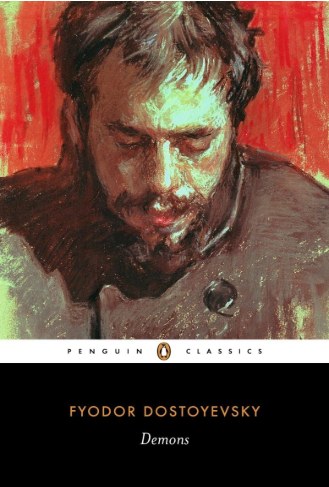Demons

"Demons" (also known as The Devils or The Possessed) is a powerful and unsettling novel by Fyodor Dostoyevsky, first published in 1872. Set in 19th-century Russia, the book follows a group of radical, revolutionary intellectuals who plot to overthrow the existing social and political order. The central figure is Pyotr Verkhovensky, a charismatic and manipulative leader who seeks to ignite chaos through violence and subversion. At the heart of the novel is Nikolai Stavrogin, a brooding and enigmatic figure whose personal moral crisis and apathy contribute to the destabilizing forces within the group. As their plans unfold, the novel delves into themes of nihilism, spiritual crisis, and the corrupting influence of radical ideologies. Demons is both a psychological drama and a political commentary, exploring the destructive potential of unchecked passion and the quest for meaning in a society on the brink of change.
"Demons" is one of Dostoyevsky’s most ambitious and provocative works, showcasing his deep understanding of human nature and his prescient insight into the dangers of radical political movements. The novel is a scathing critique of nihilism and the dangerous allure of ideologies that promise to upend society but ultimately lead to moral and spiritual decay. The plot is complex and charged with tension, as Dostoyevsky expertly weaves together the lives of various characters, each representing different philosophical and ideological positions.
Pyotr Verkhovensky, the primary antagonist, is a master manipulator, using his intellectualism and charisma to control and deceive others, while his followers, including the troubled and conflicted Stavrogin, become pawns in his grand scheme. Stavrogin himself is one of Dostoyevsky’s most fascinating and morally ambiguous characters, a man who seems indifferent to life and death, and whose inner turmoil and lack of faith make him a symbol of the emptiness that can arise when individuals lose their sense of purpose. The novel’s portrayal of his alienation and moral collapse is both chilling and tragic.
One of the most striking aspects of "Demons" is Dostoyevsky's exploration of the psychological motivations behind revolutionary fervor. The characters are deeply flawed, yet they are not mere caricatures; Dostoyevsky delves into their fears, desires, and contradictions, painting a nuanced picture of human weakness and the allure of destructive ideologies. The novel explores the tension between personal freedom and the desire for collective action, as well as the catastrophic consequences when individuals and societies abandon traditional values in favor of ideological purity.
The political and philosophical dimensions of the novel are as relevant today as they were in Dostoyevsky’s time. "Demons" serves as a cautionary tale about the dangers of radicalism and the ways in which ideologies can dehumanize individuals. The novel’s focus on the intersection of personal and political collapse makes it both a psychological thriller and a profound meditation on the nature of evil and human suffering.
"Demons" is a dense and challenging read, but it is an incredibly rewarding one for those who are interested in exploring the complex interplay between philosophy, politics, and human psychology. The novel is ideal for readers who are drawn to deep intellectual engagement with themes like nihilism, existential despair, and the destructive consequences of revolutionary ideologies. While it may be difficult for some to navigate due to its philosophical depth and large cast of characters, those who appreciate Dostoyevsky's probing psychological insights and his exploration of the darker side of human nature will find Demons a compelling and thought-provoking masterpiece. I highly recommend this book for anyone interested in political philosophy, the psychology of extremism, or Dostoyevsky's powerful literary voice.